《长恨歌》英译
《长恨歌》英译后半段赏析

《长恨歌》英译后半段赏析《长恨歌》是唐代著名诗人白居易所作的一首长篇叙事诗,被誉为“诗中的诗”,对中国古代文学史上产生了深远的影响。
这首诗以唐玄宗和杨玉环的爱情故事为主线,叙述了唐玄宗的荒淫和杨玉环的悲剧命运,深刻反映了封建社会中权贵与民生的矛盾,被誉为“中国古代小说的巅峰之作”。
《长恨歌》的英文翻译本有两个版本,一个是杨振宁教授所译的《The Song of the Great Yan Emperor》,另一个是唐家璇所译的《The Song of the Long-Hated Emperor》。
本文将重点探讨这两个版本中后半段的赏析。
杨振宁所译的《长恨歌》后半段以“天增岁月人增寿,current political matters素不知”开篇,这里的“天增岁月人增寿”意指岁月无情,时间流逝,而人却因之生老病死,生命短暂。
接着,“current political matters素不知”,点明了唐玄宗和杨玉环的悲剧命运,的政治现实让他们变得毫无知觉,他们的爱情故事也注定只能以悲剧的结局收场。
在诗的后半段,杨家璇对诗中的意象进行了深入的解读。
他指出,“and the next two lines describe the situation of the king and queen in the capital at this time.The capital is a city of war,and the two leaders are constantly in danger of being overthrown by their enemies.The last two lines of the poem suggest a sense of power and impunity,as if the couple are living in a state of permanent crisis.”(诗的后两联描写了当时的政治局势和唐玄宗、杨玉环所处的危险境地。
白居易《长恨歌》的六个英译版本比较
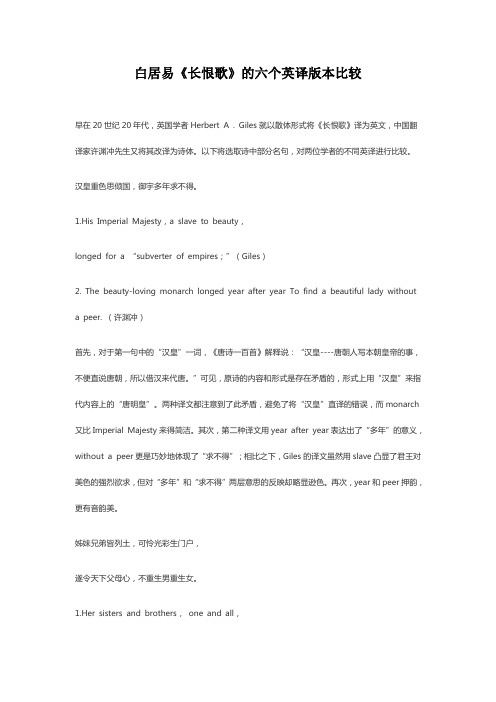
白居易《长恨歌》的六个英译版本比较早在20世纪20年代,英国学者Herbert A . Giles就以散体形式将《长恨歌》译为英文,中国翻译家许渊冲先生又将其改译为诗体。
以下将选取诗中部分名句,对两位学者的不同英译进行比较。
汉皇重色思倾国,御宇多年求不得。
1.His Imperial Majesty,a slave to beauty,longed for a “subverter of empires;”(Giles)2. The beauty-loving monarch longed year after year To find a beautiful lady withouta peer. (许渊冲)首先,对于第一句中的“汉皇”一词,《唐诗一百首》解释说:“汉皇----唐朝人写本朝皇帝的事,不便直说唐朝,所以借汉来代唐。
”可见,原诗的内容和形式是存在矛盾的,形式上用“汉皇”来指代内容上的“唐明皇”。
两种译文都注意到了此矛盾,避免了将“汉皇”直译的错误,而monarch 又比Imperial Majesty来得简洁。
其次,第二种译文用year after year表达出了“多年”的意义,without a peer更是巧妙地体现了“求不得”;相比之下,Giles的译文虽然用slave凸显了君王对美色的强烈欲求,但对“多年”和“求不得”两层意思的反映却略显逊色。
再次,year和peer押韵,更有音韵美。
姊妹兄弟皆列土,可怜光彩生门户,遂令天下父母心,不重生男重生女。
1.Her sisters and brothers,one and all,were raised to the rank of nobles.Alas!for the ill-omened glorieswhich she conferred on her family.For thus it came about that fathers and mothersthrough the length and breadth of empireRejoiced no longer over the birth of sons,But over the birth of daughters.(Giles)2.Her sisters and brothers all received rank and fiefAnd honors showered on her household,to the griefOf fathers and mothers who would rather give birthTo a fair maiden than to any son on earth.(许渊冲)从形式上来看,第一种译文有8行,第二种只有4行,正好与原诗的四句相对应,因此后者在形美上更胜一筹。
长安三万里诗歌英文字幕

长安三万里诗歌英文字幕长安三万里是中国古代文学名著《长恨歌》中的一首诗,描述了唐玄宗与杨贵妃之间的爱情故事。
这首诗被翻译成英文的版本有很多,以下是其中一种可能的英文翻译:A journey of thirty thousand miles to Chang'an,。
The love between us will never fade.In the spring breeze, the city is covered with flowers,。
But the yearning in my heart is hard to bear.The moon shines on the palace, casting a shadow,。
I dream of you, but you are far away.The sound of the flute brings back memories,。
And I am filled with sorrow and regret.The river of time flows endlessly,。
But our love will withstand the test.Even if we are separated by a thousand mountains and rivers,。
I will always cherish the love we shared.This translation captures the essence of the original poem and conveys the emotions and imagery present in the Chinese text. It reflects the longing, beauty, and melancholy of the poem, and allows English speakers to appreciate the depth of the ancient Chinese literary masterpiece.。
对《长恨歌》两种英译本的对比
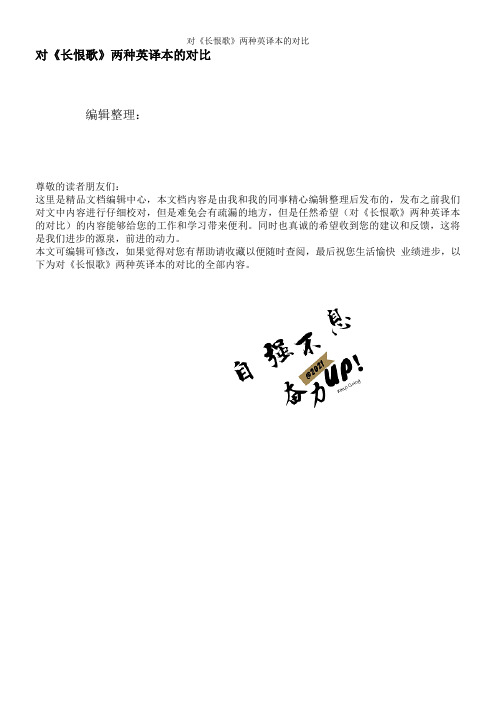
对《长恨歌》两种英译本的对比编辑整理:尊敬的读者朋友们:这里是精品文档编辑中心,本文档内容是由我和我的同事精心编辑整理后发布的,发布之前我们对文中内容进行仔细校对,但是难免会有疏漏的地方,但是任然希望(对《长恨歌》两种英译本的对比)的内容能够给您的工作和学习带来便利。
同时也真诚的希望收到您的建议和反馈,这将是我们进步的源泉,前进的动力。
本文可编辑可修改,如果觉得对您有帮助请收藏以便随时查阅,最后祝您生活愉快业绩进步,以下为对《长恨歌》两种英译本的对比的全部内容。
对《长恨歌》两种英译本的对比《长恨歌》是李白脍炙人口的长篇叙事诗,在这首长篇叙事诗里,作者将精炼绝妙的语言,生动鲜明的形象,扣人心弦叙事和荡气回肠的抒情相结合,叙述了唐玄宗、杨贵妃浪漫又凄惨的爱情故事。
文中众多诗句如“在天愿作比翼鸟,在地愿为连理枝"都成为了千古流传的佳句。
对于《长恨歌》的英译本,很多中外翻译名家都尝试翻译了这曲“千古绝唱”,如许渊冲先生、杨宪益及其夫人戴乃迭、英国学者Herbert A。
Giles和W。
J。
Flecture等。
本文将对许渊冲和杨氏夫妇的译本进行对比分析。
从全诗的风格上来看,杨氏夫妇的翻译风格是“忠实,清晰”.许渊冲的翻译则主张“翻译不一定是对等方式,尽可能发挥语言优势”,他的文学翻译主张“三美论,三之论,优化论”.其中“三美论"指:“意美,形美,音美”;“三之论”指:“知之,乐之,好之”;“优化论"指:“浅化,等化,深化”.他们的翻译风格在译文中都有很明显的风格体现。
从全诗的整体翻译结构上讲,杨宪益和戴乃迭版的疑问共有208句.这比原诗多了88句,而许渊冲版的译文正好为120句,与原诗句数相同。
杨译的整篇诗文大部分是两句来解释一句原文.这样的翻译体现了他们“忠实原文,意思清晰”的翻译风格。
这样的翻译可以使读者更好的比较完整的理解白居易的原诗,但是他们的翻译并没有进行适当的意译,甚至会有不恰当的地方,这对最终译本都是有所影响的。
对《长恨歌》两种英译本的对比
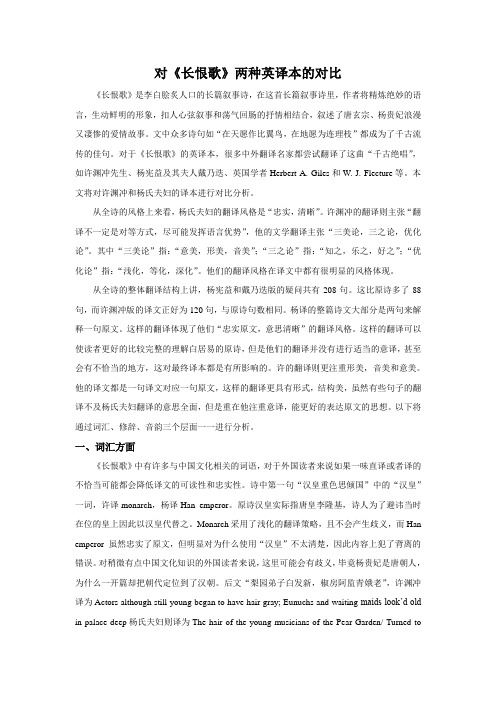
对《长恨歌》两种英译本的对比《长恨歌》是李白脍炙人口的长篇叙事诗,在这首长篇叙事诗里,作者将精炼绝妙的语言,生动鲜明的形象,扣人心弦叙事和荡气回肠的抒情相结合,叙述了唐玄宗、杨贵妃浪漫又凄惨的爱情故事。
文中众多诗句如“在天愿作比翼鸟,在地愿为连理枝”都成为了千古流传的佳句。
对于《长恨歌》的英译本,很多中外翻译名家都尝试翻译了这曲“千古绝唱”,如许渊冲先生、杨宪益及其夫人戴乃迭、英国学者Herbert A. Giles和W. J. Flecture等。
本文将对许渊冲和杨氏夫妇的译本进行对比分析。
从全诗的风格上来看,杨氏夫妇的翻译风格是“忠实,清晰”。
许渊冲的翻译则主张“翻译不一定是对等方式,尽可能发挥语言优势”,他的文学翻译主张“三美论,三之论,优化论”。
其中“三美论”指:“意美,形美,音美”;“三之论”指:“知之,乐之,好之”;“优化论”指:“浅化,等化,深化”。
他们的翻译风格在译文中都有很明显的风格体现。
从全诗的整体翻译结构上讲,杨宪益和戴乃迭版的疑问共有208句。
这比原诗多了88句,而许渊冲版的译文正好为120句,与原诗句数相同。
杨译的整篇诗文大部分是两句来解释一句原文。
这样的翻译体现了他们“忠实原文,意思清晰”的翻译风格。
这样的翻译可以使读者更好的比较完整的理解白居易的原诗,但是他们的翻译并没有进行适当的意译,甚至会有不恰当的地方,这对最终译本都是有所影响的。
许的翻译则更注重形美,音美和意美。
他的译文都是一句译文对应一句原文,这样的翻译更具有形式,结构美,虽然有些句子的翻译不及杨氏夫妇翻译的意思全面,但是重在他注重意译,能更好的表达原文的思想。
以下将通过词汇、修辞、音韵三个层面一一进行分析。
一、词汇方面《长恨歌》中有许多与中国文化相关的词语,对于外国读者来说如果一味直译或者译的不恰当可能都会降低译文的可读性和忠实性。
诗中第一句“汉皇重色思倾国”中的“汉皇”一词,许译monarch,杨译Han emperor。
秦大川 诗词汉译英
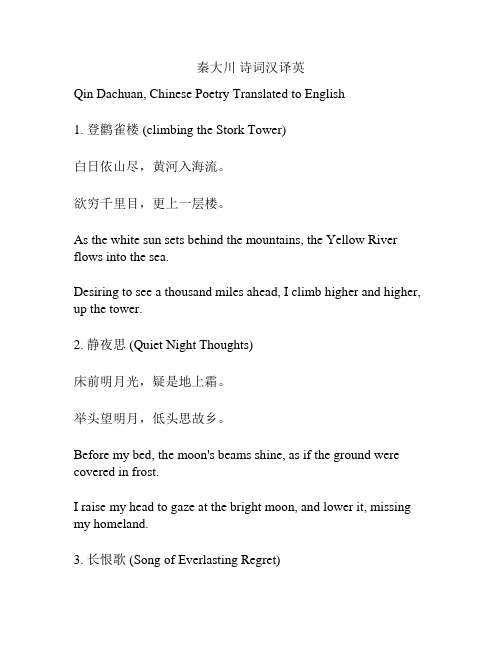
秦大川诗词汉译英Qin Dachuan, Chinese Poetry Translated to English1. 登鹳雀楼 (climbing the Stork Tower)白日依山尽,黄河入海流。
欲穷千里目,更上一层楼。
As the white sun sets behind the mountains, the Yellow River flows into the sea.Desiring to see a thousand miles ahead, I climb higher and higher, up the tower.2. 静夜思 (Quiet Night Thoughts)床前明月光,疑是地上霜。
举头望明月,低头思故乡。
Before my bed, the moon's beams shine, as if the ground were covered in frost.I raise my head to gaze at the bright moon, and lower it, missing my homeland.3. 长恨歌 (Song of Everlasting Regret)汉皇重色思倾国,御宇多年求不得。
杨家有女初长成,养在深闺人未识。
Heaven's Emperor cherishes beauty, longing to have his beloved. For years, he sought her without success in his grand palace.In the Yang family, a girl blossomed into womanhood, hidden away and unknown.4. 将进酒 (Toasting the Wine)君不见黄河之水天上来,奔流到海不复回。
君不见高堂明镜悲白发,朝如青丝暮成雪。
《长恨歌》三种英译本对比研究
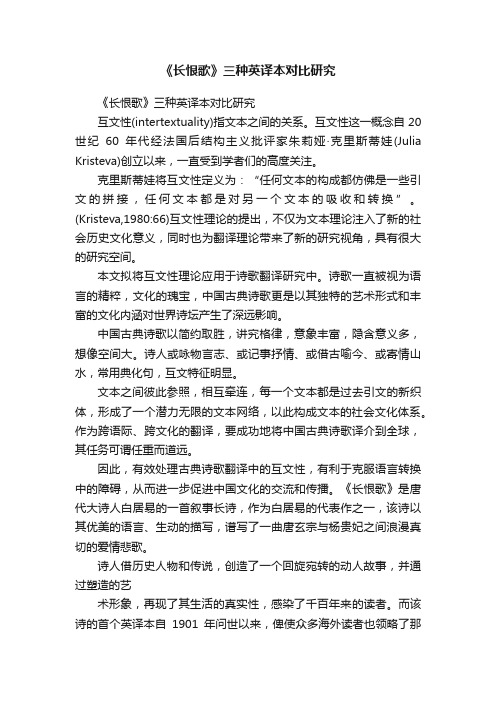
《长恨歌》三种英译本对比研究《长恨歌》三种英译本对比研究互文性(intertextuality)指文本之间的关系。
互文性这一概念自20世纪60年代经法国后结构主义批评家朱莉娅·克里斯蒂娃(Julia Kristeva)创立以来,一直受到学者们的高度关注。
克里斯蒂娃将互文性定义为:“任何文本的构成都仿佛是一些引文的拼接,任何文本都是对另一个文本的吸收和转换”。
(Kristeva,1980:66)互文性理论的提出,不仅为文本理论注入了新的社会历史文化意义,同时也为翻译理论带来了新的研究视角,具有很大的研究空间。
本文拟将互文性理论应用于诗歌翻译研究中。
诗歌一直被视为语言的精粹,文化的瑰宝,中国古典诗歌更是以其独特的艺术形式和丰富的文化内涵对世界诗坛产生了深远影响。
中国古典诗歌以简约取胜,讲究格律,意象丰富,隐含意义多,想像空间大。
诗人或咏物言志、或记事抒情、或借古喻今、或寄情山水,常用典化句,互文特征明显。
文本之间彼此参照,相互牵连,每一个文本都是过去引文的新织体,形成了一个潜力无限的文本网络,以此构成文本的社会文化体系。
作为跨语际、跨文化的翻译,要成功地将中国古典诗歌译介到全球,其任务可谓任重而道远。
因此,有效处理古典诗歌翻译中的互文性,有利于克服语言转换中的障碍,从而进一步促进中国文化的交流和传播。
《长恨歌》是唐代大诗人白居易的一首叙事长诗,作为白居易的代表作之一,该诗以其优美的语言、生动的描写,谱写了一曲唐玄宗与杨贵妃之间浪漫真切的爱情悲歌。
诗人借历史人物和传说,创造了一个回旋宛转的动人故事,并通过塑造的艺术形象,再现了其生活的真实性,感染了千百年来的读者。
而该诗的首个英译本自1901年问世以来,俾使众多海外读者也领略了那“一篇长恨有风情”。
近年来,对《长恨歌》英译本的研究日渐增多,然而,从互文性的视角对其进行系统全面的研究,尚不多见。
本文以互文性理论为指导,分别选取了弗莱彻(W.Fletcher),许渊冲和杨宪益、戴乃迭夫妇的三个《长恨歌》英译本作为个案研究。
《长恨歌》三种英译本对比研究
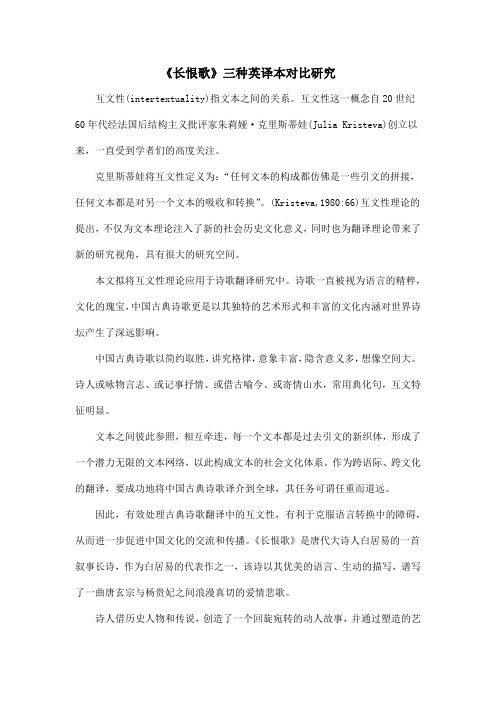
《长恨歌》三种英译本对比研究互文性(intertextuality)指文本之间的关系。
互文性这一概念自20世纪60年代经法国后结构主义批评家朱莉娅·克里斯蒂娃(Julia Kristeva)创立以来,一直受到学者们的高度关注。
克里斯蒂娃将互文性定义为:“任何文本的构成都仿佛是一些引文的拼接,任何文本都是对另一个文本的吸收和转换”。
(Kristeva,1980:66)互文性理论的提出,不仅为文本理论注入了新的社会历史文化意义,同时也为翻译理论带来了新的研究视角,具有很大的研究空间。
本文拟将互文性理论应用于诗歌翻译研究中。
诗歌一直被视为语言的精粹,文化的瑰宝,中国古典诗歌更是以其独特的艺术形式和丰富的文化内涵对世界诗坛产生了深远影响。
中国古典诗歌以简约取胜,讲究格律,意象丰富,隐含意义多,想像空间大。
诗人或咏物言志、或记事抒情、或借古喻今、或寄情山水,常用典化句,互文特征明显。
文本之间彼此参照,相互牵连,每一个文本都是过去引文的新织体,形成了一个潜力无限的文本网络,以此构成文本的社会文化体系。
作为跨语际、跨文化的翻译,要成功地将中国古典诗歌译介到全球,其任务可谓任重而道远。
因此,有效处理古典诗歌翻译中的互文性,有利于克服语言转换中的障碍,从而进一步促进中国文化的交流和传播。
《长恨歌》是唐代大诗人白居易的一首叙事长诗,作为白居易的代表作之一,该诗以其优美的语言、生动的描写,谱写了一曲唐玄宗与杨贵妃之间浪漫真切的爱情悲歌。
诗人借历史人物和传说,创造了一个回旋宛转的动人故事,并通过塑造的艺术形象,再现了其生活的真实性,感染了千百年来的读者。
而该诗的首个英译本自1901年问世以来,俾使众多海外读者也领略了那“一篇长恨有风情”。
近年来,对《长恨歌》英译本的研究日渐增多,然而,从互文性的视角对其进行系统全面的研究,尚不多见。
本文以互文性理论为指导,分别选取了弗莱彻(W.Fletcher),许渊冲和杨宪益、戴乃迭夫妇的三个《长恨歌》英译本作为个案研究。
白居易《长恨歌》的六个英译版本比较

白居易《长恨歌》的六个英译版本比较收稿日期:2018-08-22作者简介:张占军(1976-),男(汉族),河北石家庄人,北京师范大学比较文学与世界文学专业2014级博士研究生,北京第二外国语学院教师,研究方向:比较文学、翻译。
白居易是唐代著名诗人,中国文学界普遍认为他在唐代诗人中的地位仅次于李白和杜甫。
白居易的代表作《长恨歌》是熔叙事抒情于一炉的长诗,讲述了唐明皇和杨贵妃的爱情故事。
《长恨歌》被翻译成多种文字,流传到全世界,其中被翻译为英语就不止一次。
不同英语版本的《长恨歌》差异很大。
在本文中,笔者将选取六个版本进行对别,力图发现其中的异同,并找到一些翻译规律。
一、题目的英译由于中文《长恨歌》的题目中有“歌”这个字,代表张占军(北京师范大学,北京100875)摘要:白居易是唐代著名诗人,代表作有《长恨歌》等。
《长恨歌》有不同的英文翻译版本,在本文中,笔者将对其中六个英译本的部分诗句进行对比,试图发现一些翻译规律。
关键词:《长恨歌》;白居易;英文翻译版本中图分类号:G04文献标志码:A文章编号:1674-9324(2019)17-0033-03【专题研讨】一种诗歌的体裁,六位(视杨宪益、戴乃迭夫妇为一位译者)译者中有两人译出了这种体裁,分别使用的是“song ”和“ballad ”,其余译者可能认为读者一眼能从开始的几句中判定体裁,因此把精力用在了“长”和“恨”的翻译上。
对于“长”的处理,“abiding ”和“eternal ”相比较其他看起来“简单易懂”的形容词,似乎更有文学性一些。
“恨”的处理要复杂一些。
翟里斯译为“错误”(wrong )这样的表达,是否会给读者一个先入为主的印象呢?所谓“错”,到底是指唐明皇不应该纳杨玉环为妃(因为杨玉环本来是唐明皇的儿子———寿王的王妃),还是唐明皇在马嵬坡不得不赐死杨贵妃?亦或会暗示译者自己的价值判断,即对于唐明皇和杨贵妃之间爱情的价值判断?从中国人的理解出发,一般认为白居易写《长恨歌》是赞美唐明皇和杨贵妃的爱情的,对于杨贵妃后来被赐死是心存惋惜的,这样看来,“wrong ”一词的使用是译者根据自己的理解而选取的。
白居易《长恨歌》的六个英译版本比较

白居易《长恨歌》的六个英译版本比较作者:张占军来源:《教育教学论坛》2019年第17期摘要:白居易是唐代著名诗人,代表作有《长恨歌》等。
《长恨歌》有不同的英文翻译版本,在本文中,笔者将对其中六个英译本的部分诗句进行对比,试图发现一些翻译规律。
关键词:《长恨歌》;白居易;英文翻译版本中图分类号:G04 文献标志码:A 文章编号:1674-9324(2019)17-0033-03白居易是唐代著名诗人,中国文学界普遍认为他在唐代诗人中的地位仅次于李白和杜甫。
白居易的代表作《长恨歌》是熔叙事抒情于一炉的长诗,讲述了唐明皇和杨贵妃的爱情故事。
《长恨歌》被翻译成多种文字,流传到全世界,其中被翻译为英语就不止一次。
不同英语版本的《长恨歌》差异很大。
在本文中,笔者将选取六个版本进行对别,力图发现其中的异同,并找到一些翻译规律。
一、题目的英译由于中文《长恨歌》的题目中有“歌”这个字,代表一种诗歌的体裁,六位(视杨宪益、戴乃迭夫妇为一位译者)译者中有两人译出了这种体裁,分别使用的是“song”和“ballad”,其余译者可能认为读者一眼能从开始的几句中判定体裁,因此把精力用在了“长”和“恨”的翻译上。
对于“长”的处理,“abiding”和“eternal”相比较其他看起来“简单易懂”的形容词,似乎更有文学性一些。
“恨”的处理要复杂一些。
翟里斯译为“错误”(wrong)这样的表达,是否会给读者一个先入为主的印象呢?所谓“错”,到底是指唐明皇不应该纳杨玉环为妃(因为杨玉环本来是唐明皇的儿子——寿王的王妃),还是唐明皇在马嵬坡不得不赐死杨贵妃?亦或会暗示译者自己的价值判断,即对于唐明皇和杨贵妃之间爱情的价值判断?从中国人的理解出发,一般认为白居易写《长恨歌》是赞美唐明皇和杨贵妃的爱情的,对于杨贵妃后来被赐死是心存惋惜的,这样看来,“wrong”一词的使用是译者根据自己的理解而选取的。
使用“哀伤”(sorrow)的有两位译者,分别是杨宪益、戴乃迭夫妇和宾纳。
白居易《长恨歌》英译
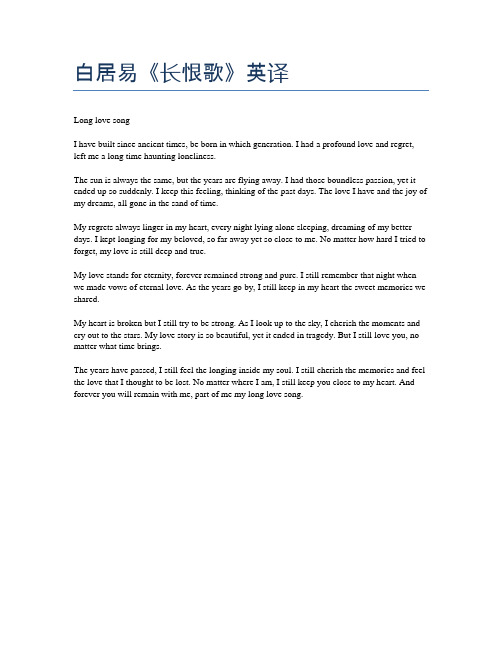
白居易《长恨歌》英译Long love songI have built since ancient times, be born in which generation. I had a profound love and regret, left me a long time haunting loneliness.The sun is always the same, but the years are flying away. I had those boundless passion, yet it ended up so suddenly. I keep this feeling, thinking of the past days. The love I have and the joy of my dreams, all gone in the sand of time.My regrets always linger in my heart, every night lying alone sleeping, dreaming of my better days. I kept longing for my beloved, so far away yet so close to me. No matter how hard I tried to forget, my love is still deep and true.My love stands for eternity, forever remained strong and pure. I still remember that night when we made vows of eternal love. As the years go by, I still keep in my heart the sweet memories we shared.My heart is broken but I still try to be strong. As I look up to the sky, I cherish the moments and cry out to the stars. My love story is so beautiful, yet it ended in tragedy. But I still love you, no matter what time brings.The years have passed, I still feel the longing inside my soul. I still cherish the memories and feel the love that I thought to be lost. No matter where I am, I still keep you close to my heart. And forever you will remain with me, part of me my long love song.。
白居易的《长恨歌》及其英译
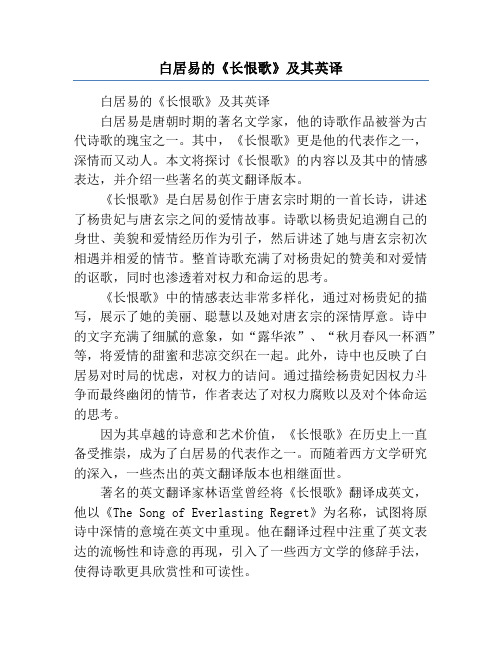
白居易的《长恨歌》及其英译白居易的《长恨歌》及其英译白居易是唐朝时期的著名文学家,他的诗歌作品被誉为古代诗歌的瑰宝之一。
其中,《长恨歌》更是他的代表作之一,深情而又动人。
本文将探讨《长恨歌》的内容以及其中的情感表达,并介绍一些著名的英文翻译版本。
《长恨歌》是白居易创作于唐玄宗时期的一首长诗,讲述了杨贵妃与唐玄宗之间的爱情故事。
诗歌以杨贵妃追溯自己的身世、美貌和爱情经历作为引子,然后讲述了她与唐玄宗初次相遇并相爱的情节。
整首诗歌充满了对杨贵妃的赞美和对爱情的讴歌,同时也渗透着对权力和命运的思考。
《长恨歌》中的情感表达非常多样化,通过对杨贵妃的描写,展示了她的美丽、聪慧以及她对唐玄宗的深情厚意。
诗中的文字充满了细腻的意象,如“露华浓”、“秋月春风一杯酒”等,将爱情的甜蜜和悲凉交织在一起。
此外,诗中也反映了白居易对时局的忧虑,对权力的诘问。
通过描绘杨贵妃因权力斗争而最终幽闭的情节,作者表达了对权力腐败以及对个体命运的思考。
因为其卓越的诗意和艺术价值,《长恨歌》在历史上一直备受推崇,成为了白居易的代表作之一。
而随着西方文学研究的深入,一些杰出的英文翻译版本也相继面世。
著名的英文翻译家林语堂曾经将《长恨歌》翻译成英文,他以《The Song of Everlasting Regret》为名称,试图将原诗中深情的意境在英文中重现。
他在翻译过程中注重了英文表达的流畅性和诗意的再现,引入了一些西方文学的修辞手法,使得诗歌更具欣赏性和可读性。
另一位著名的英文翻译家David Hawkes也曾将《长恨歌》译为英文,他在翻译中保持了原始的韵律和形式。
他的翻译版本被称为《The Song of Eternal Sorrow》,注重了对原诗的准确传达,力求将原著的意境和情感完整地呈现在英文中。
这两位翻译家的版本都有其独到之处,林语堂更注重了英文表达的流畅性和诗意的再现,而David Hawkes则更注重了原著的形式和韵律。
白居易 对酒五首 英译

白居易对酒五首英译1.《琵琶行》英译:Long has been my passion,the lute's sweet sound, Through dim rooms and corridors resounding round.Its golden strings woven in silk and pure,Sharp echoes ripple through the azure.Missives of pain and joy the lute doth bear,Its lamenting voices filling the air.Played by skilled hands,each note so fine,Telling tales of love,desire,and wine.2.《长恨歌》英译:The moon on high casts its gentle light,Upon the palace walls,so pure and white.A thousand years of love and endless woe,In this tale of a beauty's overthrow.A monarch's heart,entangled in desire,Bound by duty,his soul consumed by fire.Their tragic fate,a love that could not mend,Aching hearts,forever doomed to contend.3.《东篱乐府》英译:In the eastern garden,bamboo fences grow,Upon which laden blooms,their fragrance willow.A graceful melody fills the tranquil air,A lute's sweet voice,light as a bird's prayer.Whispering winds dance with the strings in tune,Embracing nature's harmony,a blissful boon.Through the melody,the poet's heart springs,As nature's wonders to his soul it brings.4.《问刘十九》英译:'Tis a beautiful night,the moon shines bright,Silent the courtyard,bathed in silver light.In the quietude,whispers of longing sigh,Desire's flame,flickering low,to defy.Liu,my dear friend,lost to life's cruel fate,Your vibrant spirit,forever shall I wait.In heavenly realm,may your soul find peace,As we journey on,longing for release.5.《秋思》英译:In the autumn breeze,leaves gently fall,Whispering secrets,shared with none at all.The silver moon hangs amidst a starry sky,A lonely heart,yearning for a lover's sigh.Memories of love,like leaves,fade away,Leaving behind an emptiness to stay.Yet hope lingers,a flickering flame inside,A yearning soul,seeking its love to confide.以上即为《白居易对酒五首英译》的文档内容。
《长恨歌》英文篇(12)

Breaking the golden pin
And keeping the jewel lid.
As long as our love lasts
Like jewels and gold,
We may meet again
In heaven or on earth."
Before they parted
《长恨歌》英文篇(12) 2018-03-01 长恨歌 breaking the golden pin and keeping the jewel lid. as long as our love lasts like jewels and gold, we may meet again in heaven or on earth." before they parted she again sent this message, containing a pledge only she and the emperor knew. in the palace of eternal youth on the seventh of the seventh moon, alone they had whispered to each other at midnight: "in heaven we shall he birds flying side by side. on earth flowering sprigs on the same branch!" heaven and earth may not last for ever, but this sorrow was eternal. 【《长恨歌》英文篇】相关文章: 1. 长恨歌 2. 长恨歌 3. 《长恨歌》 4. 《长恨歌》,《长恨歌序》与《长恨歌传》的关系 5. 外国经典散文篇 6. 张小娴散文篇 7. 长恨歌的作文 8. 《长恨歌》的教案 点击展开全文 共12页: 上一页 1 2 3 4 5 6 7 8 9 10 11 12 下一页
《长恨歌》英文篇
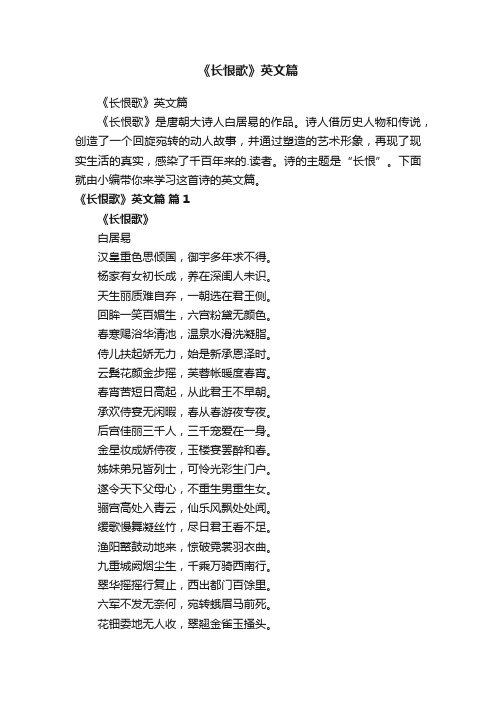
《长恨歌》英文篇《长恨歌》英文篇《长恨歌》是唐朝大诗人白居易的作品。
诗人借历史人物和传说,创造了一个回旋宛转的动人故事,并通过塑造的艺术形象,再现了现实生活的真实,感染了千百年来的.读者。
诗的主题是“长恨”。
下面就由小编带你来学习这首诗的英文篇。
《长恨歌》英文篇篇1《长恨歌》白居易汉皇重色思倾国,御宇多年求不得。
杨家有女初长成,养在深闺人未识。
天生丽质难自弃,一朝选在君王侧。
回眸一笑百媚生,六宫粉黛无颜色。
春寒赐浴华清池,温泉水滑洗凝脂。
侍儿扶起娇无力,始是新承恩泽时。
云鬓花颜金步摇,芙蓉帐暖度春宵。
春宵苦短日高起,从此君王不早朝。
承欢侍宴无闲暇,春从春游夜专夜。
后宫佳丽三千人,三千宠爱在一身。
金星妆成娇侍夜,玉楼宴罢醉和春。
姊妹弟兄皆列士,可怜光彩生门户。
遂令天下父母心,不重生男重生女。
骊宫高处入青云,仙乐风飘处处闻。
缓歌慢舞凝丝竹,尽日君王看不足。
渔阳鼙鼓动地来,惊破霓裳羽衣曲。
九重城阙烟尘生,千乘万骑西南行。
翠华摇摇行复止,西出都门百馀里。
六军不发无奈何,宛转蛾眉马前死。
花钿委地无人收,翠翘金雀玉搔头。
君王掩面救不得,回看血泪相和流。
黄埃散漫风萧索,云栈萦纡登剑阁。
峨嵋山下少人行,旌旗无光日色薄。
蜀江水碧蜀山青,圣主朝朝暮暮情。
行宫见月伤心色,夜雨闻铃肠断声。
天旋地转回龙驭,到此踌躇不能去。
马嵬坡下泥土中,不见玉颜空死处。
君臣相顾尽沾衣,东望都门信马归。
归来池苑皆依旧,太液芙蓉未央柳。
芙蓉如面柳如眉,对此如何不泪垂! 春风桃李花开日,秋雨梧桐叶落时。
西宫南内多秋草,落叶满阶红不扫。
梨园子弟白发新,椒房阿监青娥老。
夕殿萤飞思悄然,孤灯挑尽未成眠。
迟迟钟鼓初长夜,耿耿星河欲曙天。
鸳鸯瓦冷霜华重,翡翠衾寒谁与共? 悠悠生死别经年,魂魄不曾来入梦。
临邛道士鸿都客,能以精诚致魂魄。
为感君王辗转思,遂教方士殷勤觅。
排空驭气奔如电,升天入地求之遍。
上穷碧落下黄泉,两处茫茫皆不见。
忽闻海上有仙山,山在虚无缥缈间。
白居易的《长恨歌》及其英译
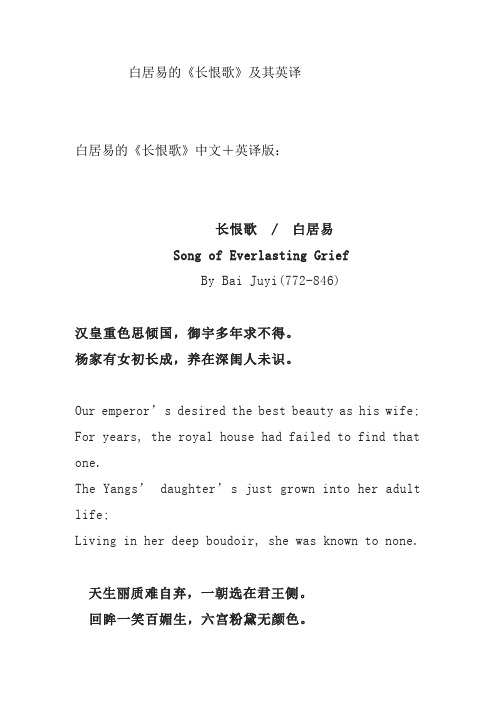
白居易的《长恨歌》及其英译白居易的《长恨歌》中文+英译版:长恨歌/ 白居易Song of Everlasting GriefBy Bai Juyi(772-846)汉皇重色思倾国,御宇多年求不得。
杨家有女初长成,养在深闺人未识。
Our emperor’s desired the best beauty as his wife; For years, the royal house had failed to find that one.The Yangs’ daughter’s just grown into her adult life;Living in her deep boudoir, she was known to none.天生丽质难自弃,一朝选在君王侧。
回眸一笑百媚生,六宫粉黛无颜色。
How could she be secluded since she was so fair? She was chosen to stay at his Majesty’s sides. All beauties in the palace couldn’t be her compare; Her backward glance and smile caused all charms to arise.春寒赐浴华清池,温泉水滑洗凝脂。
侍儿扶起娇无力,始是新承恩泽时。
In cold spring, she’s ordered to bathe in Huaqing Pool;Warm water washed her rouge and powder, smooth and fair.When she was helped out, she was so frail and so cool, At once, she won his Majesty’s love and tender care.云鬓花颜金步摇,芙蓉帐暖度春宵。
长恨歌对照翻译
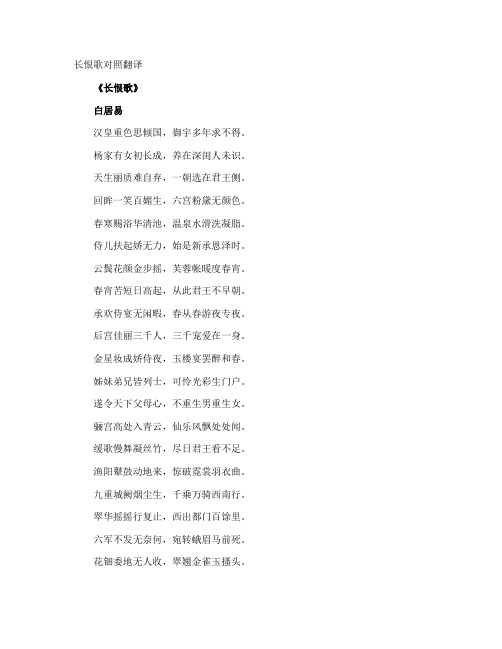
长恨歌对照翻译《长恨歌》白居易汉皇重色思倾国,御宇多年求不得。
杨家有女初长成,养在深闺人未识。
天生丽质难自弃,一朝选在君王侧。
回眸一笑百媚生,六宫粉黛无颜色。
春寒赐浴华清池,温泉水滑洗凝脂。
侍儿扶起娇无力,始是新承恩泽时。
云鬓花颜金步摇,芙蓉帐暖度春宵。
春宵苦短日高起,从此君王不早朝。
承欢侍宴无闲暇,春从春游夜专夜。
后宫佳丽三千人,三千宠爱在一身。
金星妆成娇侍夜,玉楼宴罢醉和春。
姊妹弟兄皆列士,可怜光彩生门户。
遂令天下父母心,不重生男重生女。
骊宫高处入青云,仙乐风飘处处闻。
缓歌慢舞凝丝竹,尽日君王看不足。
渔阳鼙鼓动地来,惊破霓裳羽衣曲。
九重城阙烟尘生,千乘万骑西南行。
翠华摇摇行复止,西出都门百馀里。
六军不发无奈何,宛转蛾眉马前死。
花钿委地无人收,翠翘金雀玉搔头。
君王掩面救不得,回看血泪相和流。
黄埃散漫风萧索,云栈萦纡登剑阁。
峨嵋山下少人行,旌旗无光日色薄。
蜀江水碧蜀山青,圣主朝朝暮暮情。
行宫见月伤心色,夜雨闻铃肠断声。
天旋地转回龙驭,到此踌躇不能去。
马嵬坡下泥土中,不见玉颜空死处。
君臣相顾尽沾衣,东望都门信马归。
归来池苑皆依旧,太液芙蓉未央柳。
芙蓉如面柳如眉,对此如何不泪垂! 春风桃李花开日,秋雨梧桐叶落时。
西宫南内多秋草,落叶满阶红不扫。
梨园子弟白发新,椒房阿监青娥老。
夕殿萤飞思悄然,孤灯挑尽未成眠。
迟迟钟鼓初长夜,耿耿星河欲曙天。
鸳鸯瓦冷霜华重,翡翠衾寒谁与共? 悠悠生死别经年,魂魄不曾来入梦。
临邛道士鸿都客,能以精诚致魂魄。
为感君王辗转思,遂教方士殷勤觅。
排空驭气奔如电,升天入地求之遍。
上穷碧落下黄泉,两处茫茫皆不见。
忽闻海上有仙山,山在虚无缥缈间。
楼阁玲珑五云起,其中绰约多仙子。
中有一人字太真,雪肤花貌参差是。
金阙西厢叩玉扃,转教小玉报双成。
闻道汉家天子使,九华帐里梦魂惊。
揽衣推枕起徘徊,珠箔银屏迤逦开。
云鬓半偏新睡觉,花冠不整下堂来。
风吹仙袂飘飘举,犹似霓裳羽衣舞。
玉容寂寞泪阑干,梨花一枝春带雨。
- 1、下载文档前请自行甄别文档内容的完整性,平台不提供额外的编辑、内容补充、找答案等附加服务。
- 2、"仅部分预览"的文档,不可在线预览部分如存在完整性等问题,可反馈申请退款(可完整预览的文档不适用该条件!)。
- 3、如文档侵犯您的权益,请联系客服反馈,我们会尽快为您处理(人工客服工作时间:9:00-18:30)。
长恨歌白居易著汉皇重色思倾国,御宇多年求不得。
杨家有女初长成,养在深闺人未识。
天生丽质难自弃,一朝选在君王侧。
回眸一笑百媚生,六宫粉黛无颜色。
春寒赐浴华清池,温泉水滑洗凝脂。
侍儿扶起娇无力,始是新承恩泽时。
云鬓花颜金步摇,芙蓉帐暖度春宵。
春宵苦短日高起,从此君王不早朝。
承欢侍宴无闲暇,春从春游夜专夜。
后宫佳丽三千人,三千宠爱在一身。
金星妆成娇侍夜,玉楼宴罢醉和春。
姊妹弟兄皆列士,可怜光彩生门户。
遂令天下父母心,不重生男重生女。
骊宫高处入青云,仙乐风飘处处闻。
缓歌慢舞凝丝竹,尽日君王看不足。
渔阳鼙鼓动地来,惊破霓裳羽衣曲。
九重城阙烟尘生,千乘万骑西南行。
翠华摇摇行复止,西出都门百馀里。
六军不发无奈何,宛转蛾眉马前死。
花钿委地无人收,翠翘金雀玉搔头。
君王掩面救不得,回看血泪相和流。
黄埃散漫风萧索,云栈萦纡登剑阁。
峨嵋山下少人行,旌旗无光日色薄。
蜀江水碧蜀山青,圣主朝朝暮暮情。
行宫见月伤心色,夜雨闻铃肠断声。
天旋地转回龙驭,到此踌躇不能去。
马嵬坡下泥土中,不见玉颜空死处。
君臣相顾尽沾衣,东望都门信马归。
归来池苑皆依旧,太液芙蓉未央柳。
芙蓉如面柳如眉,对此如何不泪垂!春风桃李花开日,秋雨梧桐叶落时。
西宫南内多秋草,落叶满阶红不扫。
梨园子弟白发新,椒房阿监青娥老。
夕殿萤飞思悄然,孤灯挑尽未成眠。
迟迟钟鼓初长夜,耿耿星河欲曙天。
鸳鸯瓦冷霜华重,翡翠衾寒谁与共?悠悠生死别经年,魂魄不曾来入梦。
临邛道士鸿都客,能以精诚致魂魄。
为感君王辗转思,遂教方士殷勤觅。
排空驭气奔如电,升天入地求之遍。
上穷碧落下黄泉,两处茫茫皆不见。
忽闻海上有仙山,山在虚无缥缈间。
楼阁玲珑五云起,其中绰约多仙子。
中有一人字太真,雪肤花貌参差是。
金阙西厢叩玉扃,转教小玉报双成。
闻道汉家天子使,九华帐里梦魂惊。
揽衣推枕起徘徊,珠箔银屏迤逦开。
云鬓半偏新睡觉,花冠不整下堂来。
风吹仙袂飘飘举,犹似霓裳羽衣舞。
玉容寂寞泪阑干,梨花一枝春带雨。
含情凝睇谢君王,一别音容两渺茫。
昭阳殿里恩爱绝,蓬莱宫中日月长。
回头下望人寰处,不见长安见尘雾。
唯将旧物表深情,钿合金钗寄将去。
钗留一股合一扇,钗擘黄金合分钿。
但教心似金钿坚,天上人间会相见。
临别殷勤重寄词,词中有誓两心知。
七月七日长生殿,夜半无人私语时。
在天愿作比翼鸟,在地愿为连理枝。
天长地久有时尽,此恨绵绵无绝期!译文一:杨宪益、戴乃迭译Song of Eternal SorrowAppreciating feminine charms,The Han emperor sought a great beauty. Throughout his empire he searchedFor many years without success.Then a daughter of the Yang family Matured to womanhood.Since she was secluded in her chamber, None outside had seen her.Yet with such beauty bestowed by fate, How could she remain unknown?One day she was chosenTo attend the emperor.Glancing back and smiling,She revealed a hundred charms.All the powdered ladies of the six palaces At once seemed dull and colourless.One cold spring day she was orderedTo bathe in the Huaqing Palace baths. The warm water slipped downHer glistening jade-like body.When her maids helped her rise,She looked so frail and lovely,At once s he won the emperor’s favour.Her hair like a cloud,Her face like a flower,A gold hair-pin adorning her tresses.Behind the warm lotus-flower curtain,They took their pleasure in the spring night. Regretting only the spring nights were too short; Rising only when the sun was high;He stopped attending court sessionsIn the early morning.Constantly she amused and feasted with him, Accompanying him on his spring outings, Spending all the nights with him.Though many beauties were in the palace,More than three thousand of them,All his favours were centred on her.Finishing her coiffure in the gilded chamber, Charming, she accompanied him at night. Feasting together in the marble pavilion, Inebriated in the spring.All her sisters and brothersBecame nobles with fiefs.How wonderful to have so much splendour Centred in one family!All parents wished for daughtersInstead of sons!The Li Mountain lofty pleasure palaceReached to the blue sky.The sounds of heavenly music were carriedBy the wind far and wide.Gentle melodies and graceful dancesMingled with the strings and flutes;The emperor never tired of these.Then battle drums shook the earth,The alarm sounding from Yuyang.The Rainbow and Feather Garments DanceWas stopped by sounds of war.Dust filled the high-towered capital.As thousands of carriages and horsemenFled to the southwest.The emperor’s green-canopied carriageWas forced to halt,Having left the west city gateMore than a hundred li.There was nothing the emperor could do,At the army’s re fusal to proceed.So she with the moth-like eyebrowsWas killed before his horses.Her floral-patterned gilded boxFell to the ground, abandoned and unwanted, Like her jade hair-pinWith the gold sparrow and green feathers. Covering his face with his hands,He could not save her.Turning back to look at her,His tears mingled with her blood.Yellow dust filled the sky;The wind was cold and shrill.Ascending high winding mountain paths, They reached the Sword Pass,At the foot of the Emei Mountains.Few came that way.Their banners seemed less resplendent;Even the sun seemed dim.Though the rivers were deep blue,And the Sichuan mountains green,Night and day the emperor mourned.In his refuge when he saw the moon,Even it seemed sad and wan.On rainy nights, the sound of bellsSeemed broken-hearted.Fortunes changed, the emperor was restored. His dragon-carriage started back.Reaching the place where she died,He lingered, reluctant to leave.In the earth and dust of Mawei Slope,No lady with the jade-like face was found. The spot was desolate.Emperor and servants exchanged looks, Their clothes stained with tears.Turning eastwards towards the capital,They led their horses slowly back.The palace was unchanged on his return, With lotus blooming in the Taiye PoolAnd willows in the Weiyang Palace.The lotus flowers were like her face;The willows like her eyebrows.How could he refrain from tearsAt their sight?The spring wind returned at night;The peach and plum trees blossomed again.Plane leaves fell in the autumn rains.Weeds choked the emperor’s west palace;Piles of red leaves on the unswept steps.The hair of the young musicians of the Pear Garden Turned to grey.The green-clad maids of the spiced chambersWere growing old.At night when glow-worms flitted in the pavilionHe thought of her in silence.The lonely lamp was nearly extinguished,Yet still he could not sleep.The slow sound of hells and drumsWas heard in the long night.The Milky Way glimmered bright.It was almost dawn.Cold and frosty the paired love-bird tiles;Chilly the kingfisher-feathered quiltWith none to share it.Though she had died years before,Even her spirit was absent from his dreams.A priest from Linqiong came to Chang’an,Said to summon spirits at his will.Moved by the emperor’s longing for her,He sent a magician to make a careful search.Swift as lightning, through the air he sped,Up to the heavens, below the earth, everywhere. Though they searched the sky and nether regions, Of her there was no sign.Till he heard of a fairy mountainIn the ocean of a never-never land.Ornate pavilions rose through coloured clouds, Wherein dwelt lovely fairy folk.One was named Taizhen,With snowy skin and flowery beauty,Suggesting that this might be she.When he knocked at the jade doorOf the gilded palace’s west chamber,A fairy maid, Xiaoyu, answered,Reporting to another, Shuangcheng.On hearing of the messengerFrom the Han emperor,She was startled from her sleepBehind the gorgeous curtain.Dressing, she drew it back,Rising hesitantly.The pearl curtains and silver screens Opened in succession.Her cloudy tresses were awry,Just summoned from her sleep.Without arranging her flower headdress, She entered the hall.The wind blew her fairy skirt,Lifting it, as if she still dancedThe Rainbow and Feather Garments Dance. But her pale face was sad,Tears filled her eyes,Like a blossoming pear tree in spring, With rain drops on its petals.Controlling her feelings and looking away, She thanked the emperor.Since their parting she had not heardHis voice nor seen his face.While she had been his first lady,Their love had been ruptured.Many years had passedOn Penglai fairy isle.Turning her head,She gazed down on the mortal world. Chang’an could not be seen,Only mist and dust.She presented old mementosTo express her deep feeling.Asking the messenger to takeThe jewel box and the golden pin.“I’ll keep one half of the pin and box; Breaking the golden pinAnd keeping the jewel lid.As long as our love lastsLike jewels and gold,We may meet againIn heaven or on earth.”Before they partedShe again sent this message, Containing a pledgeOnly she and the emperor knew.In the Palace of Eternal YouthOn the seventh of the seventh moon, Alone they had whisperedTo each other at midnight:“In heaven we shall he birdsFlying side by side.On earth flowering sprigsOn the same branch!”Heaven and earth may not last for ever, But this sorrow was eternal.。
